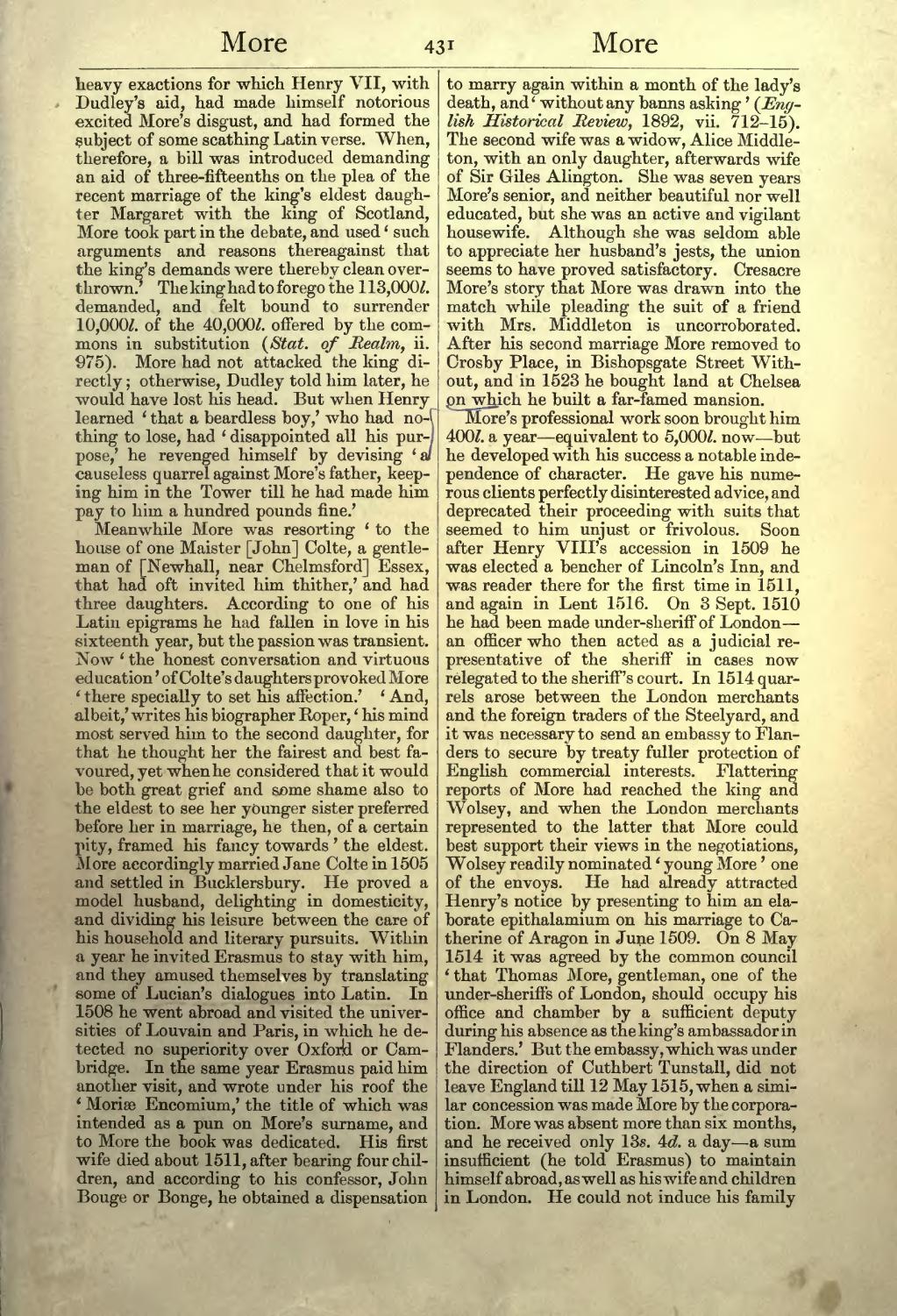heavy exactions for which Henry VII, with Dudley's aid, had made himself notorious excited More's disgust, and had formed the subject of some scathing Latin verse. When, therefore, a bill was introduced demanding an aid of three-fifteenths on the plea of the recent marriage of the king's eldest daughter Margaret with the king of Scotland, More took part in the debate, and used ‘such arguments and reasons thereagainst that the king's demands were thereby clean overthrown.’ The king had to forego the 113,000l. demanded, and felt bound to surrender 10,000l. of the 40,000l. offered by the commons in substitution (Stat. of Realm, ii. 975). More had not attacked the king directly; otherwise, Dudley told him later, he would have lost his head. But when Henry learned ‘that a beardless boy,’ who had nothing to lose, had ‘disappointed all his purpose,’ he revenged himself by devising ‘a causeless quarrel against More's father, keeping him in the Tower till he had made him pay to him a hundred pounds fine.’
Meanwhile More was resorting ‘to the house of one Maister [John] Colte, a gentleman of [Newhall, near Chelmsford] Essex, that had oft invited him thither,’ and had three daughters. According to one of his Latin epigrams he had fallen in love in his sixteenth year, but the passion was transient. Now ‘the honest conversation and virtuous education’ of Colte's daughters provoked More ‘there specially to set his affection.’ ‘And, albeit,’ writes his biographer Roper, ‘his mind most served him to the second daughter, for that he thought her the fairest and best favoured, yet when he considered that it would be both great grief and some shame also to the eldest to see her younger sister preferred before her in marriage, he then, of a certain pity, framed his fancy towards’ the eldest. More accordingly married Jane Colte in 1505 and settled in Bucklersbury. He proved a model husband, delighting in domesticity, and dividing his leisure between the care of his household and literary pursuits. Within a year he invited Erasmus to stay with him, and they amused themselves by translating some of Lucian's dialogues into Latin. In 1508 he went abroad and visited the universities of Louvain and Paris, in which he detected no superiority over Oxford or Cambridge. In the same year Erasmus paid him another visit, and wrote under his roof the ‘Moriæ Encomium,’ the title of which was intended as a pun on More's surname, and to More the book was dedicated. His first wife died about 1511, after bearing four children, and according to his confessor, John Bouge or Bonge, he obtained a dispensation to marry again within a month of the lady's death, and ‘without any banns asking’ (English Historical Review, 1892, vii. 712-15). The second wife was a widow, Alice Middleton, with an only daughter, afterwards wife of Sir Giles Alington. She was seven years More's senior, and neither beautiful nor well educated, but she was an active and vigilant housewife. Although she was seldom able to appreciate her husband's jests, the union seems to have proved satisfactory. Cresacre More's story that More was drawn into the match while pleading the suit of a friend with Mrs. Middleton is uncorroborated. After his second marriage More removed to Crosby Place, in Bishopsgate Street Without, and in 1523 he bought land at Chelsea on which he built a far-famed mansion.
More's professional work soon brought him 400l. a year—equivalent to 5,000l. now—but he developed with his success a notable independence of character. He gave his numerous clients perfectly disinterested advice, and deprecated their proceeding with suits that seemed to him unjust or frivolous. Soon after Henry VIII's accession in 1509 he was elected a bencher of Lincoln's Inn, and was reader there for the first time in 1511, and again in Lent 1516. On 3 Sept. 1510 he had been made under-sheriff of London—an officer who then acted as a judicial representative of the sheriff in cases now relegated to the sheriff's court. In 1514 quarrels arose between the London merchants and the foreign traders of the Steelyard, and it was necessary to send an embassy to Flanders to secure by treaty fuller protection of English commercial interests. Flattering reports of More had reached the king and Wolsey, and when the London merchants represented to the latter that More could best support their views in the negotiations, Wolsey readily nominated ‘young More’ one of the envoys. He had already attracted Henry's notice by presenting to him an elaborate epithalamium on his marriage to Catherine of Aragon in June 1509. On 8 May 1514 it was agreed by the common council ‘that Thomas More, gentleman, one of the under-sheriffs of London, should occupy his office and chamber by a sufficient deputy during his absence as the king's ambassador in Flanders.’ But the embassy, which was under the direction of Cuthbert Tunstall, did not leave England till 12 May 1515, when a similar concession was made More by the corporation. More was absent more than six months, and he received only 13s. 4d a day—a sum insufficient (he told Erasmus) to maintain himself abroad, as well as his wife and children in London. He could not induce his family

